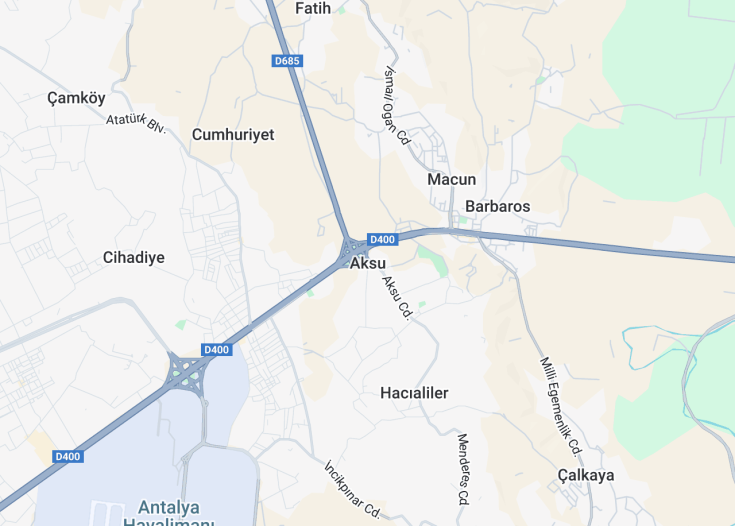Discover Aksu, a captivating district in the Antalya region of Turkey, known for its lush landscapes and rich history. A hidden gem on the Turkish Riviera, Aksu charms with its blend of natural beauty and ancient ruins, including the renowned Perge archaeological site, which showcases an impressive Roman theatre and stadium. Ideal for history enthusiasts and nature lovers alike, Aksu offers a unique peek into the past while providing serene settings for leisure and exploration.
Pack comfortable shoes for exploring Aksu’s historical sites and natural terrains, ensuring a more enjoyable and immersive experience.
Visit in the early spring or late autumn to enjoy mild weather and fewer crowds, enhancing your experience of Aksu’s historical and natural sites.
Top things to do & see in Aksu
Select the following sights and activities to discover best tickets and tours available in Aksu.
Aksu: Gateway to Ancient Wonders
| Country | Turkey |
| Time in Aksu | GMT+3 |
| Language spoken | Turkish |
| Population | 251,000 (According to the latest data collection) |
| Currency | Turkish Lira (₺, TRY) |
| Airports |
|
Aksu, in Turkey, is a city steeped in history and culture, located at a crossroads of ancient civilizations. With its bustling urban center and its proximity to notable archaeological sites, Aksu serves not only as a hub for commerce and trade but also as a gateway to exploring the rich historical tapestry of Turkey. The population of Aksu has been steadily growing, reflective of its increasing importance as both a tourist destination and a business center.
Where is Aksu?
Aksu is situated in the Antalya province of Turkey, nestled between the Taurus Mountains and the Mediterranean Sea.
Distances:
| Route | Distance by car | Time by car |
|---|---|---|
| Ankara to Aksu | 290 miles | 5 hours 30 mins |
| Istanbul to Aksu | 480 miles | 8 hours 15 mins |
| Izmir to Aksu | 350 miles | 6 hours |
What is Aksu famous for?
Aksu is renowned for its proximity to the ruins of Perge, one of the most significant Roman archaeological sites in Turkey, which attracts thousands of history enthusiasts every year.
History
Ancient Beginnings: Pre-1st Millennium BCE
The history of Aksu, a captivating town nestled in Turkey, traces back to ancient times when it was inhabited by various Anatolian civilizations. These early settlers were primarily engaged in agriculture, benefiting from the fertile lands and favorable climate of the region.
Roman and Byzantine Era: 1st Century BCE – 15th Century
The area saw significant changes with the advent of the Roman Empire, under which it developed substantially. Following the division of the Roman Empire, Aksu became part of the Byzantine Empire. During this period, the town witnessed the construction of several Byzantine churches and fortifications, indicating its strategic and religious importance.
Ottoman Influence: 15th – 20th Century
The Ottoman Empire took control of Aksu in the 15th century, marking a new era of development. The town became a vital hub for trade and commerce within the empire. Ottoman architecture, including mosques, baths, and markets, started to appear, many of which remain to this day as historical sites.
Modern Era: 20th Century to Present
In the 20th century, particularly with the establishment of the Turkish Republic, Aksu underwent rapid modernization. The town adapted to contemporary lifestyles while preserving its historical heritage. Today, it is known for its rich history blended with modern attractions, making it a unique destination for visitors.
Visit Aksu
What to see and do in Aksu, Turkey.
Aksu offers a blend of historical sites and natural beauty. Key attractions include:
- The Aksu Archaeological Museum: Home to artifacts from the Roman and Byzantine periods.
- Perge Ancient City: Just a short drive from Aksu, this ancient city offers a glimpse into its rich historical past.
- Kurşunlu Waterfall: A stunning natural wonder, perfect for a day of relaxation and nature walks.
Besides exploring these sites, visitors can enjoy local cuisine at traditional Turkish restaurants or explore the nearby markets for unique handicrafts.
Festivals and Events in Aksu
Throughout the year, Aksu is host to various cultural and traditional events:
- The Aksu Culture and Art Festival, held in September, features music, dance, and food showcasing the rich cultural heritage of the region.
- The Spring Flower Festival in April celebrates the blooming season with flower shows and horticultural workshops.
These events provide a great opportunity not only to have fun but also to engage with the local community and traditions.
Best time to visit Aksu
The optimal time to visit Aksu is during spring (April to June) and autumn (September to November). During these months, the weather is mild, and the natural scenery is at its best, making it ideal for sightseeing and outdoor activities.
Is Aksu worth visiting?
Aksu is undoubtedly worth visiting for those who appreciate both history and nature. The town not only offers insights into ancient civilizations through its well-preserved archaeological sites but also provides a serene escape with its beautiful natural landscapes. Whether you’re a history buff, nature lover, or simply looking for a peaceful retreat, Aksu has something to offer.









